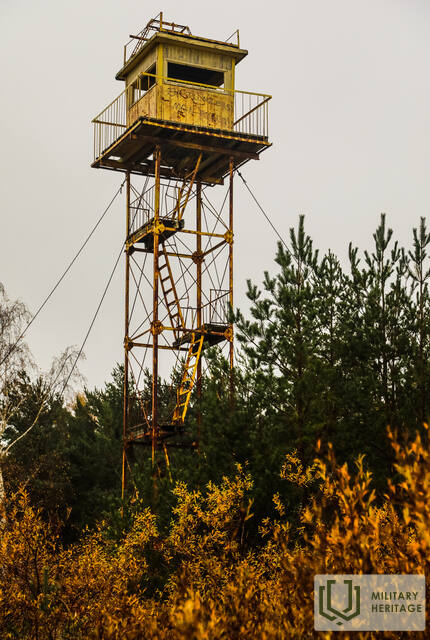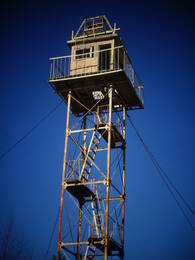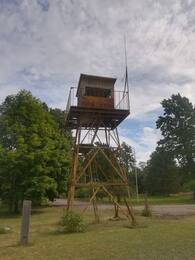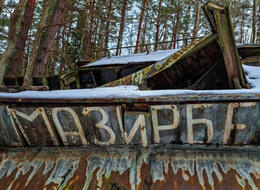„Atgal į Mazirbę“ (fragmentas)
Aštrus įvykis iš Vilnio Blumbergo gyvenimo, kai jis atvyko į Mazirbę aplankyti tetos, virto nemaloniu nesusipratimu su sovietų pasienio apsaugos pareigūnais ir atšiauria žiemos naktimi.
1950 m., sausio pabaigoje, t. y. per studentų žiemos atostogas, lankydamasis pas tėvus Dundagoje, susidūriau su vairuotoju, kuris tuojau pat sunkvežimiu nuvažiavo per Mazirbę į Pitragą ir tuoj pat atgal. Negalėjau norėti idealesnio varianto – aplankyti savo mamos seserį Klarą Helmans, kuri gyveno Mazirbėje, „Vecbunkų“ namuose. Tuo metu ten nebuvo reguliaraus autobusų susisiekimo, o nuvykti į Mazirbę buvo gana sunku. Klaros teta, pagal profesiją siuvėja, man buvo pasiuvusi baltą chalatą, kurį turėjau dėvėti studijų RMI (Rygos medicinos institute) metu. Parduotuvėse, kaip ir šiandien, jų be „blatų“ (čia: ryšių su kariškiais) neįsigijau.
Kaip vėliau paaiškėjo, labai apsidžiaugiau maloniu susitikimu su teta, nes kai dulkėtu, snieguotu keliu pasiekėme Mazirbės pasienio apsaugos postą, paaiškėjo, kad neturiu visų reikalingų dokumentų, kad galėčiau būti griežtai ribojamoje pasienio zonoje. Akimirksniu viskas kardinaliai pasikeitė!
Vietoj šviesios ir džiaugsmingos Klaros tetos šypsenos, teko žiūrėti į užburtą pasikorusio pasienio sargybos viršininko šeimą ir klausytis grasinimo, kad tokius sienos pažeidėjus reikia bent vietoje sušaudyti, kad netrikdytų šviesaus sovietinių žmonių gyvenimo. Bandžiau ginčytis, kad esu beveik vietinis, nes beveik 10 metų gyvenu Mazirbėje, mokiausi mokykloje, vokietmečiu apėjau visus namus iš eilės, nešdamas tuo metu vadinamąjį „žiedinį“, ir beveik kiekvienas šuo, kur dar yra žmonių, mane atpažintų.
Jokie kontrargumentai nepadėjo. Šiam „štafofonui“ buvo naudinga tai, kas įvyko, traktuoti kaip pavojingo sienos pažeidėjo sugavimą nusikaltimo vietoje, siekiant už budrumą pelnyti viršininkų pagyrimus ir galbūt net paaukštinimą tarnyboje. Kaip žinia, pasieniečiai jau gaudavo pagyrų ir apdovanojimų vien už tai, kad surado batą pajūrio smėlyje! Šį kartą majoras netgi leido suprasti, kad atkeliavau per užšalusią jūrą, galbūt net iš Švedijos, kuri pučia kapitalistinėje santvarkoje. Šiame ramiame kampelyje pasieniečių viršininkas tikriausiai turėjo nuostabią progą kopti armijos karjeros laiptais. Kad visa tai įvyktų, buvau negailestingai uždarytas šaltame tvarto namelyje, stropiai saugomas ginkluoto kareivio, apsirengusio šiltu avikailio paltu su aksominėmis kojomis. Visa tai galėjau matyti šviesią žiemos naktį. Lentiniame namelyje buvo keli dideli tarpai, ir tai buvo aiškiai matyti mėnulio apšviestą naktį.
Kadangi temperatūra pašiūrės viduje mažai kuo skyrėsi nuo lauko ir buvo apie -20 C, man grėsė sušalimas! Nuo šio ryto nieko nebuvau valgęs ir gėręs, buvau psichologiškai pažemintas ir labai pavargęs nuo šios netikėtos patirties. Tačiau būdamas 21 metų labai norėjau išlikti gyvas, sportuoti ir nuolat judėti, kiek leido siaura erdvė. Jei ji būtų sušalusi, nebūtų jokio straipsnio, dešimčių tūkstančių gydytų pacientų, parašytų knygų, beveik 60 mokslinių straipsnių, eksperimentų, V33 (Sveikatos apsaugos ministerijos) užregistruotų33 racionalizavimo pasiūlymų, grojamų ir dainuojamų melodijų, jokio vaidmens k/f, beveik nieko panašaus. Tarsi visa tai žinotume, išlaikiau šį nežmonišką išbandymą. Netgi prisipažįstu, kad mano kraujyje cirkuliuoja keli ml tolimų protėvių lyvių kraujo. Gražias eilutes apie užsispyrusį lyvių charakterį yra parašęs mano klasės draugas, žinomas poetas Arnoldas Auziņšas:
„Jis darbštus ir stropus latvis, bet visada laisvos dvasios.“
Ir jis nepaklusnus bei užsispyręs, jo protėviai tikrai gyvi!
Ryte pusė manęs, lydimi sargybinio, buvo nuvežti iš kalėjimo į stotį, kur buvo pasodinti į specialiai išlaisvintą mažą vagoną, kur prie kiekvienų durų sėdėjo po vieną ginkluotą raudonosios armijos narį, nenugalimą, amžiną. Šautuvų galuose žibėjo nuogas durklas! Be to, visą kelią ir automobilyje apsaugą sustiprino dresuotas pėstininkų šuo ir palydovas. Tokią „garbę“ buvau užsitarnavęs tik kartą gyvenime, nes šuo mane saugojo net Mazirbės stoties tualete. Net kelių karininkų žmonos buvo atvykusios stebėti renginio, kad iš arčiau apžiūrėtų „į užsienį infiltruotus šnipus“.
Laimei, seseriai Dainai Ventspilyje pavyko atsivežti trūkstamus dokumentus ir tuo pačiu metu akimirksniu paversti ją iš pavojingos nusikaltėlės galiojančia SSRS piliete.
LIVLI – Livonijos sąjungos ir „Livonijos kranto“ mėnesinis žurnalas, 2008 m. Nr. 3
- atsiuntė Inese Roze (Talsų regiono TIC)
Susijusi laiko juosta
Susijusios vietos
Mazirbės pasienio apsaugos bokštas
Sovietinis pasienio apsaugos postas buvo įsikūręs pastate, kuriame anksčiau buvo jūreivystės mokykla, o šalia jo yra gerai išsilaikęs sovietinis pasienio sargybos bokštas. Antrasis sargybos bokštas yra tiesiai ant kranto, šalia automobilių stovėjimo aikštelės. Šie sargybos bokštai primena sovietų okupaciją ir laikus, kai Mazirbė buvo uždara pasienio zona, o civiliai gyventojai krante buvo leidžiami tik specialiai tam skirtose vietose ir tik dienos metu. Šis pasienio sargybos bokštas yra vienas geriausiai išsilaikiusių tokio tipo objektų Latvijos pakrantėje. Tačiau į jį lipti pavojinga.
Mazirbės jūreivystės mokykla
Šiame komplekse esantis sovietinis pasienio apsaugos bokštas yra vienas geriausiai išsilaikiusių tokio tipo Latvijos pakrantėje. Deja, pastatų būklė prasta, toje vietoje yra šautuvų užtaisymo/iškrovimo aikštelė, taip pat išgelbėta įvaža ir apkasų fragmentai.
Pakrančių apsaugos postas buvo įsikūręs buvusiame Jūrų mokyklos pastate. Posovietiniu laikotarpiu dalyje pastatų buvo siūlomas apgyvendinimas.
Antrasis sovietinės pasienio apsaugos bokštas yra apie 400 m nuo paplūdimio, bet, deja, yra apgriuvusios būklės. Tačiau Mazirbės laivų kapinės yra ne toliau kaip 500 m nuo paplūdimio bokšto Sīkrago kryptimi.
Mazirbės laivų kapinės
Mazirbė, istoriškai vadinama didžiausiu lyvių centru, žymi tuo, kad čia yra vienintelės žvejų laivų kapinės Latvijos pakrantėje. Jos buvo įkurtos septintajame dešimtmetyje, o paskutinės valtys buvo atgabentos 1976 m. Valtys čia atsidūrė tiek dėl žvejybos apribojimų, tiek dėl jų amžiaus.
Šiandien Mazirbėje yra mažiau nei dešimt žvejybinių laivų nuolaužų, tačiau istoriškai jų buvo daug daugiau. Laivai buvo palaidoti ir kituose pajūrio kaimuose, tačiau būtent Mazirbės laivų kapinėse tai šiandien labiausiai akivaizdu.
Mazirbės laivų kapinės yra vienintelės tokio pobūdžio Latvijos pajūryje.








